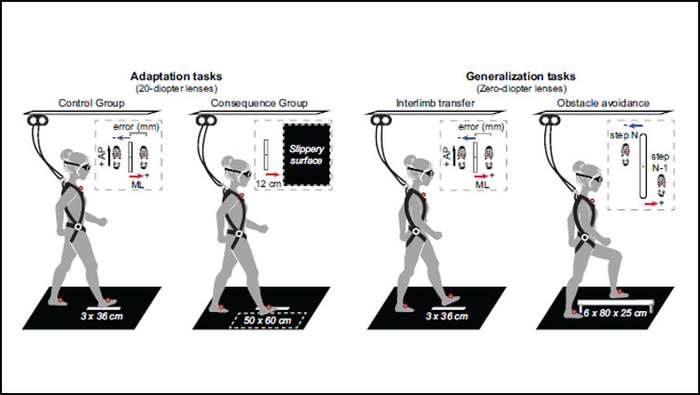Actions have consequences, and the physical consequence of slipping improves motor learning, according to research recently published in eNeuro.

Credit: Bakkum and Marigold, eNeuro 2022
Actions have consequences, and the physical consequence of slipping improves motor learning, according to research recently published in eNeuro.
The brain refines movement in response to mistakes, especially ones that can be dangerous, like a slip or stumble. But in most laboratory studies of motor learning, mistakes have no physical consequence. In a study by Bakkum and Marigold, participants walked down a walkway and stepped their right foot on a target while wearing prism googles that warped their visual field and shifted everything to the right. In one group, the walkway hid a slippery surface to the right of the target. The participants slipped until they learned to adjust their steps to the left.
The slip group and the control group adjusted to the goggles at the same pace, but the learning stuck more in the slip group. The slip group performed better in new tasks, like stepping on the target with their left foot or stepping over obstacles, a sign that their learning could generalize to other situations. One week after testing, the slip group performed better than the control group. Future studies will investigate if the surprise or emotional response to slipping improves learning, or if physical consequences themselves are an integral component of motor learning.
###
Paper title: Learning From the Physical Consequences of Our Actions Improves Motor Memory
Please contact [email protected] for full-text PDF and to join SfN’s journals media list.
About eNeuro
eNeuro is an online, open-access journal published by the Society for Neuroscience. Established in 2014, eNeuro publishes a wide variety of content, including research articles, short reports, reviews, commentaries and opinions.
About The Society for Neuroscience
The Society for Neuroscience is the world’s largest organization of scientists and physicians devoted to understanding the brain and nervous system. The nonprofit organization, founded in 1969, now has nearly 37,000 members in more than 90 countries and over 130 chapters worldwide.
Journal
eNeuro
DOI
10.1523/ENEURO.0459-21.2022
Method of Research
Experimental study
Subject of Research
People
Article Title
Learning from the physical consequences of our actions improves motor memory
Article Publication Date
23-May-2022




